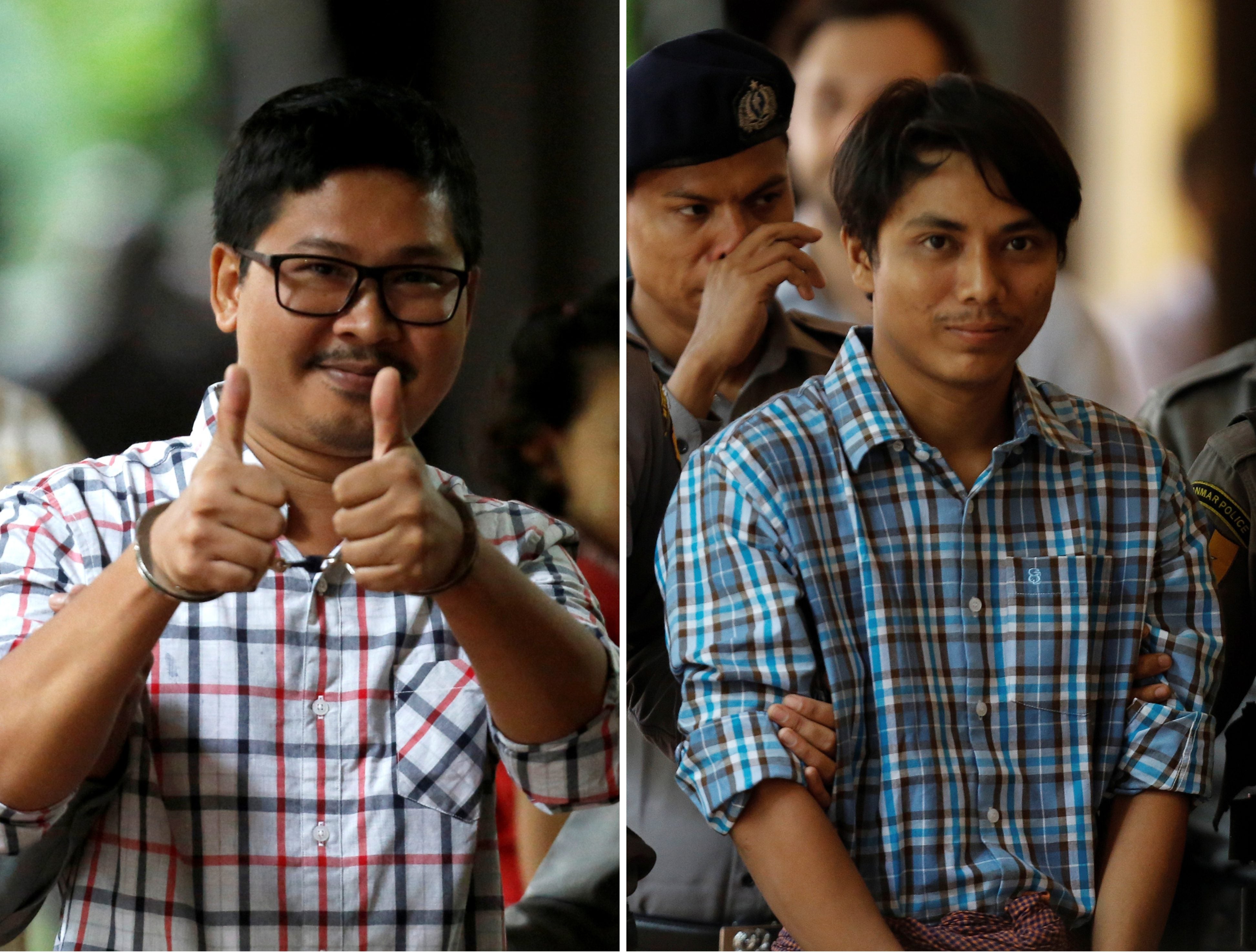
Myanmar’s top court has rejected a last-chance appeal from two Reuters reporters sentenced to seven years in prison, but the news agency has vowed to continue fighting for their release.
Wa Lone (pictured, left) and Kyaw Soe Oo (pictured, right) were convicted last year of breaching the Official Secrets Act by possessing government papers while investigating the killings of Rohingya Muslims.
An earlier appeal against the conviction, which they say was the result of a police set-up, was rejected at the High Court in Yangon in January.
The case has now failed at Myanmar’s Supreme Court, the final opportunity for an appeal to be heard.
Gail Gove, chief counsel for Reuters, said in a statement: “Wa Lone and Kyaw Soe Oo did not commit any crime, nor was there any proof that they did.
“Instead, they were victims of a police set-up to silence their truthful reporting. We will continue to do all we can to free them as soon as possible.”
The appeal was made to the Supreme Court on the grounds of evidence of a police set-up and lack of proof of a crime for the appeal.
According to Reuters, Supreme Court Justice Soe Naing said without elaboration: “They were sentenced for seven years and this decision stands, and the appeal is rejected.”
Lone and Soe Oo’s investigation into Myanmar’s crackdown on Rohingya Muslims was completed by Reuters colleagues after their arrests and subsequently won a number of journalism prizes, most recently the Pulitzer Prize for International Reporting.
The prize, for Reuters staff with notable contributions from Lone and Soe Oo, said it was for “expertly exposing the military units and Buddhist villagers responsible for the systematic expulsion and murder of Rohingya Muslims from Myanmar, courageous coverage that landed its reporters in prison”.
The two reporters have been in jail since 12 December 2017 when they were first arrested in what they described during their trial as a police set-up.
They told a judge they were handed papers at a meeting by two policemen they had not previously met before being arrested and bundled into a car by plain-clothed officers.
Matthew Tostevin, Reuters’ bureau chief for Thailand, Vietnam, Cambodia and Laos, said on Twitter today’s court decision was “terrible news, but we will not lose hope”.
Nicholas Bequelin, Amnesty International’s regional director for east and southeast Asia, described today’s court ruling as a “tragic denial of justice”.
“The Supreme Court’s rejection of Wa Lone and Kyaw Soe Oo’s appeal compounds a grave injustice and marks a dark day for press freedom in Myanmar,” he said.
“This case shows the authorities’ resolve to ensure there can be no independent reporting on the military’s atrocities in Rakhine State – even at the cost of debasing the country’s judicial system.”
Bequelin added that Lone and Soe Oo’s cases are “not isolated”, after a “disturbing surge” in recent weeks of arrests on politically motivated charges.
Shawn Crispin, the Committee to Protect Journalists’ senior southeast Asia representative, said the Myanmar authorities had “criminalised independent journalism”.
“They should both be free and able to continue their reporting, not sitting in jail cells,” he added. “Their conviction and sentence will be an enduring stain on Myanmar’s reputation.”
The International Press Institute’s director of advocacy Ravi Prasad said it was “deeply unfortunate” that Myanmar’s Supreme Court had failed to right the “serious miscarriage of justice” of Lone and Soe Oo’s sentencing.
“[They] are being deprived of their freedom for doing their job as journalists,” he said. “Their imprisonment is a grave blow to independent journalism in Myanmar and undermines the credibility of the country’s democracy.”
Pictures: Reuters/Ann Wang
Email pged@pressgazette.co.uk to point out mistakes, provide story tips or send in a letter for publication on our "Letters Page" blog
